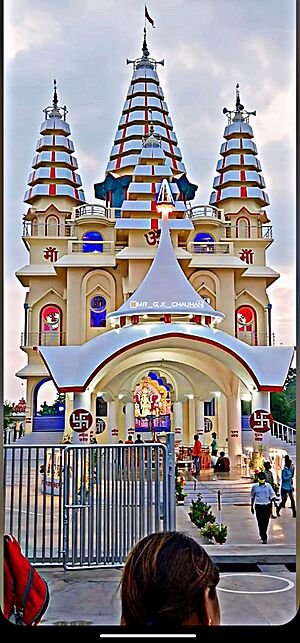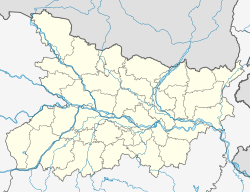Jamui facts for kids
Quick facts for kids
Jamui
|
|
|---|---|
|
Town
|
|

Maa Kalika Temple
|
|
| Country | |
| State | Bihar |
| Division | Munger |
| District | Jamui |
| Ward | 30 wards |
| Named for | Jambhiya Gram |
| Government | |
| • Type | Chairman–Nagar Parishad |
| • Body | Jamui Nagar Parishad |
| Elevation | 78 m (256 ft) |
| Population
(2011)
|
|
| • Total | 87,357 |
| Languages | |
| • Official | Hindi |
| • Additional official | English |
| Time zone | UTC+5:30 (IST) |
| PIN |
811307
|
| Telephone code | 06345 |
| ISO 3166 code | IN-BR |
| Vehicle registration | BR-46 |
| Sex ratio | 912/1000(2011) ♂/♀ |
Jamui is a town and a municipality in the Jamui district of Bihar, a state in India. It is the main administrative center for the Jamui district. Jamui became its own district on February 21, 1991, after being separated from the Munger district. It is part of the Munger Division and is located about 60 kilometers southwest of Munger.
Historians believe Jamui has existed since the time of the Mahabharata war. Old records and findings show it has a strong connection with the Jain religion. A large part of this area is covered by forests.
There are two main ideas about how Jamui got its name. One idea is that it comes from "Jambhiya Gram" or "Jribhikgram" village. This is said to be the place where Mahavira, an important figure in Jainism, achieved great wisdom. Another idea is that the name Jamui comes from "Jambuwani."
Contents
Exploring Jamui's Location and Landscape
Jamui is located at 24°55′N 86°13′E / 24.92°N 86.22°E. It sits at an average height of 78 meters (255 feet) above sea level.
The town is in a special area between the large, flat Gangetic Plain to the north and the hilly edges of the Chota Nagpur plateau to the south. The Kiul River flows along Jamui's eastern side. This river starts in the hilly region. During the monsoon season, the Kiul River can become very strong. In 1949, it flooded and destroyed a bridge northeast of Jamui.
How to Get to Jamui
Jamui is well connected by roads to other parts of India. The main Delhi-Howrah railway line is about 3 kilometers away at Mallepur. Mallepur railway station is also known as Jamui railway station. The nearest airports are Lok Nayak Jayaprakash Airport in Patna, about 161 kilometers away, and Gaya Airport, about 136 kilometers away.
Jamui is near the border of Bihar and Jharkhand. It has many hills and the small town of Simultala, which is a quiet retreat. Simultala is on the main Delhi-Howrah rail line. The town of Gidhaur, located 17 kilometers away, was once home to kings during the British Raj. Many old buildings from that time still stand there. The Minto Tower in Gidhaur is a great example of the architecture from that period. Jamui district is also known for having many places linked to the start of Jainism.
The district has many natural resources that have not been fully used yet. These include mica, coal, gold, and iron ore.
Jamui's Past: A Glimpse into History
An old fort called Indpegarh is a historic site near Jamui. It is located in the village of Indpe to the south.
Around the year 1900, Jamui was mostly described as "one long street." This main street had many shops and houses belonging to shopkeepers. Smaller streets branched off from it, leading to the residential areas of the town. The Jamui Subdivision office was at the northeast end of town. The police station was about half a kilometer southwest, and a dispensary (a type of clinic) was built nearby in 1874.
After a big flood on the Kiul River in 1949, a new bridge was built.
By 1960, Jamui had a cooperative bank and a high school for boys. A children's park was built in 1950. There was also a dak bungalow (a guesthouse) and a large water tank. The Nehru maidan (a field or open space) was named after Jawaharlal Nehru, India's first Prime Minister, who once gave a speech there. A girls' school, the Gilani Girls' M. E. School, was established in 1939. A public library, the Gandhi Adhyayan Mandal, was also built. Other important buildings included a college, a state-run hospital, and an "electric power house." A filling station (gas station) was set up, and more and more vehicles were using the main road. Buses connected Jamui with Munger and other nearby places.
People and Population in Jamui
According to the 2011 India census, Jamui had a population of 87,357 people. About 52.6% of the population were males, and 47.26% were females. The average literacy rate in Jamui was 64.33%. This was lower than the national average of 74.04%. For males, the literacy rate was 57.39%, and for females, it was 42.6%. About 16.22% of the people in Jamui were under 6 years old.
Jamui's Economy and Resources
In 2006, the Ministry of Panchayati Raj listed Jamui as one of the country's 250 most backward districts. It is one of 36 districts in Bihar that receives money from the Backward Regions Grant Fund Programme (BRGF). This fund helps areas that need more development.
Grain and timber (wood) are very important to Jamui's economy.
Notable People from Jamui
- Onkarnath Baranwal: An Indian politician from Bihar.
- Chirag Paswan: A Member of the Indian Parliament and the National President of the Lok Janshakti Party (Ram Vilas).
- Chandrashekhar Singh: A member of the Indian National Congress who served as the Chief Minister of Bihar from 1983 to 1985. He also held several other important government positions.
- Digvijay Singh: An Indian politician from Bihar who was an independent Member of Parliament.
See also
 In Spanish: Jamui para niños
In Spanish: Jamui para niños
 | Emma Amos |
 | Edward Mitchell Bannister |
 | Larry D. Alexander |
 | Ernie Barnes |


